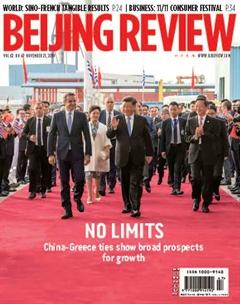The Ultimate Goal
By James C.Hsiung
Xi Jinping: The Governance of China, Volume II, is much more than the usual pro forma collection of official documents. It is a treasure of the gems of the thoughts of the nations top leader, along with his concerns and cherished goals.
If there is an overriding message that carries through all the documents, grouped under 17 sections in the volume, it is President Xi Jinpings wish to chaperone Chinese socialism to a level where governance becomes an art, keeping abreast of the challenges of the new era.
Despite the lack of narratives linking together the various sections and the various entries within each section, there is a hidden coherence running through them. For example, the opening section, Socialism with Chinese Characteristics and the Chinese Dream, is followed by two sections, respectively titled A Moderately Prosperous Society in All Respects and Deeper Reform.
A similar sequential logic puts together the section on the Rule of Law and that on Governing the [ruling] Party with Strict Discipline. Likewise, the section on The New Normal of Economic Development follows closely behind New Development Concepts.
One unavoidable topic is the Chinese mainlands relations with Macao and Hong Kong special administrative regions and Taiwan. The documents place them under the general rubric of One Country, Two Systems. Macao and Hong Kong come respectively under the subheading “One Country, Two Systems” in Macao and in Hong Kong. Taiwan is under a distinct subheading, Join Hands to Consolidate Peace and Development in Cross-Straits Relations.
In tone, the document on Macao is more matter of fact, wishing it great success in economic development. Politically, Xi alludes specifi cally to “Macao people administering Macao.” The document related to Hong Kong, on the other hand, spends some words in explaining the relationship of “one country” and “two systems” and calls on the people, especially the young, to concentrate on Hong Kongs development, never again missing a good opportunity in this respect. To this he adds, “An opportunity missed is an opportunity lost.”
But the document on cross-Straits relations, in its own way, emphasizes the common history and culture shared by the two sides across the Taiwan Straits. In tone, Xi appeals more to kinship feelings and if you will, the [hidden] common sentiments of nationalism. Particularly noteworthy is his optimistic note that the current separation since 1949 is but a brief rupture, as compared to the long common destiny that the people on both sides shared in history.
Some documents dealing with new or rare topics are grouped into clearly identified separate sections, such as Socialist Democracy, Cultural Confidence and Beautiful China.
Most interesting is the way Xi describes consultative democracy. In a document(dated 2014), Xi quotes the Peoples Republic of Chinas fi rst Premier Zhou Enlai as saying: “The spirit of deliberation of the New Democratic Revolution is not in the fi nal voting; it is mainly in the deliberations and repeated discussions that happen before a decision is made.” Xi describes consultative democracy as one in which consultation is held “both before and during the process of decision making.”
The significance of this pitch for consultative democracy as “a unique form and a distinctive strength of socialism with Chinese characteristics” was, incidentally, not lost on Daniel Bell, who published his book The China Model: Political Meritocracy and the Limits of Democracy a year later(2015). In it, Bell began by saying that China cannot fi t into the usual dichotomy of either “good democracy” or “bad autocracy.” Although he chose the epithet“meritocracy” in representing the China model, Bell, I think, was in fact echoing Xis concept of consultative democracy.
In the section on Cultural Confi dence, Xi repeats his well-known position on bringing back the outstanding traditional Chinese culture and discovering the Chinese dream thereby. Xi stresses, “Outstanding traditional culture is the root of the heritage and development of a country and a nation... We should learn how to best carry forward our fi ne cultural traditions, and at the same time promote contemporary culture.”
The last section, despite its nomenclature Chinas Diplomacy as a Major Country, concerns the ultimate question about governance. Traditional culture taught the Chinese elite the progression in the tasks of moral cultivation, going from nourishing a noble personality, rearing a united family, contributing to the governance of the homeland, to promoting peace and stability in the world (“all under the sun”). So too is Xi concerned with extending homeland governance to global governance.
Hence, domestic governance ultimately reaches out to a structure at the global level that is capable of founding a common destiny of the human community. The ultimate goal reminds one of the entrenched lofty Chinese ideal of a grand harmony and universal cornucopia, long cherished since ancient times known as datong.

